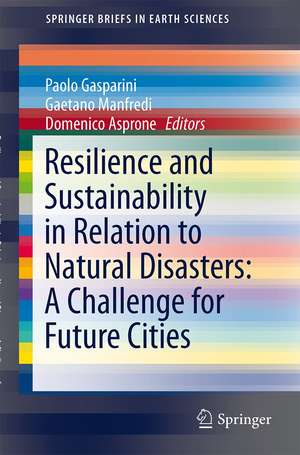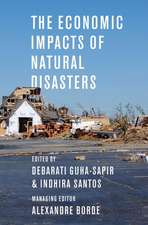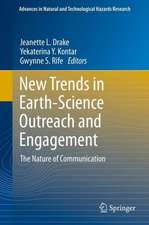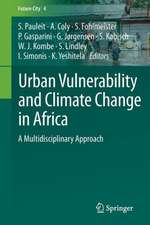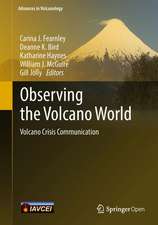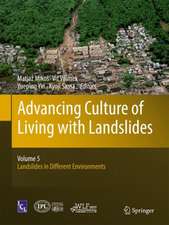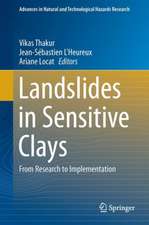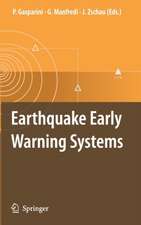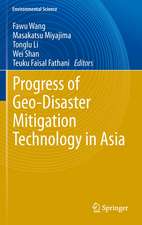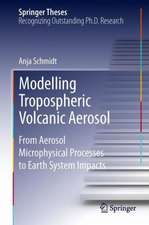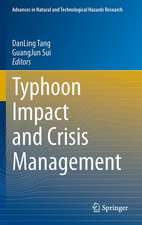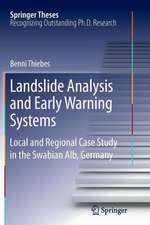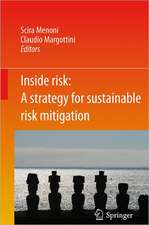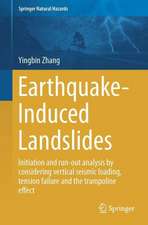Resilience and Sustainability in Relation to Natural Disasters: A Challenge for Future Cities: SpringerBriefs in Earth Sciences
Editat de Paolo Gasparini, Gaetano Manfredi, Domenico Asproneen Limba Engleză Paperback – 3 feb 2014
The resilience of cities against catastrophic events is a major challenge of today. It requires city transformation processes to be rethought, to mitigate the effects of extreme events on the vital functions of cities and communities. Redundancy and robustness of the components of the urban fabric are essential to restore the full efficiency of the city's vital functions after an extreme event has taken place. These items were addressed by an interdisciplinary and international selection of scientists during the 6th UN-World Urban Forum that was held in Naples, Italy in September 2012.
This volume represents in six chapters the views from sociologists, economists and scientists working on natural risk and physical vulnerability on resilience and sustainability for future cities in relation to natural disasters.
Din seria SpringerBriefs in Earth Sciences
-
 Preț: 380.25 lei
Preț: 380.25 lei -
 Preț: 378.12 lei
Preț: 378.12 lei -
 Preț: 290.09 lei
Preț: 290.09 lei -
 Preț: 477.72 lei
Preț: 477.72 lei -
 Preț: 381.98 lei
Preț: 381.98 lei -
 Preț: 355.07 lei
Preț: 355.07 lei -
 Preț: 355.37 lei
Preț: 355.37 lei -
 Preț: 351.90 lei
Preț: 351.90 lei -
 Preț: 381.21 lei
Preț: 381.21 lei -
 Preț: 377.35 lei
Preț: 377.35 lei -
 Preț: 342.44 lei
Preț: 342.44 lei -
 Preț: 343.98 lei
Preț: 343.98 lei - 20%
 Preț: 389.08 lei
Preț: 389.08 lei -
 Preț: 378.92 lei
Preț: 378.92 lei -
 Preț: 375.62 lei
Preț: 375.62 lei -
 Preț: 379.68 lei
Preț: 379.68 lei -
 Preț: 378.12 lei
Preț: 378.12 lei -
 Preț: 377.18 lei
Preț: 377.18 lei -
 Preț: 443.75 lei
Preț: 443.75 lei -
 Preț: 378.54 lei
Preț: 378.54 lei -
 Preț: 380.07 lei
Preț: 380.07 lei -
 Preț: 376.96 lei
Preț: 376.96 lei -
 Preț: 379.09 lei
Preț: 379.09 lei - 15%
 Preț: 464.18 lei
Preț: 464.18 lei -
 Preț: 376.96 lei
Preț: 376.96 lei -
 Preț: 348.01 lei
Preț: 348.01 lei -
 Preț: 379.48 lei
Preț: 379.48 lei -
 Preț: 375.07 lei
Preț: 375.07 lei -
 Preț: 477.94 lei
Preț: 477.94 lei -
 Preț: 376.22 lei
Preț: 376.22 lei -
 Preț: 349.41 lei
Preț: 349.41 lei -
 Preț: 381.00 lei
Preț: 381.00 lei - 15%
 Preț: 463.35 lei
Preț: 463.35 lei -
 Preț: 376.96 lei
Preț: 376.96 lei -
 Preț: 446.47 lei
Preț: 446.47 lei -
 Preț: 346.62 lei
Preț: 346.62 lei -
 Preț: 379.68 lei
Preț: 379.68 lei -
 Preț: 373.32 lei
Preț: 373.32 lei -
 Preț: 377.95 lei
Preț: 377.95 lei -
 Preț: 377.57 lei
Preț: 377.57 lei -
 Preț: 390.83 lei
Preț: 390.83 lei -
 Preț: 375.45 lei
Preț: 375.45 lei -
 Preț: 377.73 lei
Preț: 377.73 lei -
 Preț: 376.04 lei
Preț: 376.04 lei -
 Preț: 377.18 lei
Preț: 377.18 lei -
 Preț: 379.09 lei
Preț: 379.09 lei
Preț: 376.22 lei
Nou
Puncte Express: 564
Preț estimativ în valută:
71.100€ • 78.18$ • 60.48£
71.100€ • 78.18$ • 60.48£
Carte tipărită la comandă
Livrare economică 22 aprilie-06 mai
Preluare comenzi: 021 569.72.76
Specificații
ISBN-13: 9783319043159
ISBN-10: 3319043153
Pagini: 88
Ilustrații: IX, 79 p. 11 illus. in color.
Dimensiuni: 155 x 235 x 15 mm
Greutate: 0.14 kg
Ediția:2014
Editura: Springer International Publishing
Colecția Springer
Seria SpringerBriefs in Earth Sciences
Locul publicării:Cham, Switzerland
ISBN-10: 3319043153
Pagini: 88
Ilustrații: IX, 79 p. 11 illus. in color.
Dimensiuni: 155 x 235 x 15 mm
Greutate: 0.14 kg
Ediția:2014
Editura: Springer International Publishing
Colecția Springer
Seria SpringerBriefs in Earth Sciences
Locul publicării:Cham, Switzerland
Public țintă
ResearchCuprins
Economic Resilience and Its Contribution to the Sustainability of Cities.- Modeling Social Networks and Community Resilience in Chronic Disasters: Case Studies from volcanic areas in Ecuador and Mexico.- Climate Change Adaptation in Urban Planning in African Cities – The CLUVA project.- “Resilience for All” and “Collective Resilience”: Are These Planning Objectives Consistent with One Another?.- Linking Sustainability and Resilience of Future Cities.- Natural Hazards Impacting on Future Cities.- “Resilience and sustainability in Relation to Disasters: A Challenge for Future Cities” – Common Vision and Recommendations.
Textul de pe ultima copertă
The number of megacities worldwide is rapidly increasing and contemporary cities are also expanding fast. As a result, cities and their inhabitants are becoming increasingly vulnerable to the effects of catastrophic natural events such as extreme weather events (recently more frequent and intense as a result of the ongoing climate changes), earthquakes, tsunamis or man-induced events such as terrorist attacks or accidents. Furthermore, due to increasing technological complexity of urban areas, along with increasing population density, cities are becoming more and more risk attractors.
The resilience of cities against catastrophic events is a major challenge of today. It requires city transformation processes to be rethought, to mitigate the effects of extreme events on the vital functions of cities and communities. Redundancy and robustness of the components of the urban fabric are essential to restore the full efficiency of the city's vital functions after an extreme event has taken place. These items were addressed by an interdisciplinary and international selection of scientists during the 6th UN-World Urban Forum, that was held in Naples, Italy in September 2012.
This volume represents in six chapters the views from sociologists, economists, and scientists working on natural risk and physical vulnerability on resilience and sustainability for future cities in relation to natural disasters.
The resilience of cities against catastrophic events is a major challenge of today. It requires city transformation processes to be rethought, to mitigate the effects of extreme events on the vital functions of cities and communities. Redundancy and robustness of the components of the urban fabric are essential to restore the full efficiency of the city's vital functions after an extreme event has taken place. These items were addressed by an interdisciplinary and international selection of scientists during the 6th UN-World Urban Forum, that was held in Naples, Italy in September 2012.
This volume represents in six chapters the views from sociologists, economists, and scientists working on natural risk and physical vulnerability on resilience and sustainability for future cities in relation to natural disasters.
Caracteristici
Includes supplementary material: sn.pub/extras
